Brief
Jan 15 2018
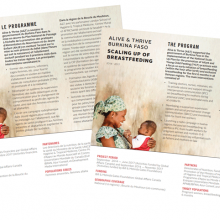
Alive & Thrive Burkina Faso: Scaling up breastfeeding
Alive & Thrive (A&T) supported the government of Burkina Faso in the implementation of the National Scale Up Plan for the promotion of Infant and Young Child Feeding (IYCF) practices with a focus on early initiation of breastfeeding (within the hour after birth) and exclusive breastfeedin
Brief
Jan 15 2018
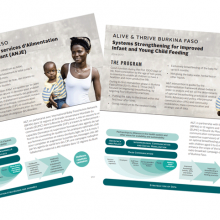
Alive & Thrive Burkina Faso: Systems strengthening for improved infant and young child feeding
A&T, in partnership with the International Baby Food Action Network (IBFAN) in 12 regions and Entraide Universitaire Mondiale du Canada (EUMC) in Boucle du Mouhoun, implemented the interpersonal communication component (IPC) through capacity building (training and supportive supervision) of h
Brief
Oct 11 2017
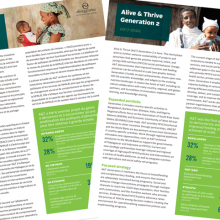
Alive & Thrive (A&T) Generation 2 Overview
Alive & Thrive (A&T) Generation 2 is here. This phase of A&T aims to further enhance sustainability of projects and processes that generate positive improvements in maternal, infant, and young child nutrition (MIYCN).
Journal article
Jul 16 2017

Changes in the policy environment for infant and young child feeding in Vietnam, Bangladesh, and Ethiopia, and the role of targeted advocacy (Harris, J., 2011. BMC Public Health)
To fill a knowledge gap of how potential contribution of targeted advocacy can improve policy environments in low and middle-income countries, this study tracked changes in the policy environment over a four-year period in three countries and examined the role of targeted nutrition and IYCF advoc
Brief
Jul 08 2017
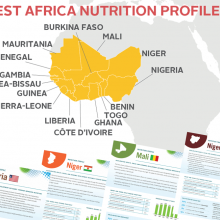
Country nutrition profile briefs
This series of country briefs report on key maternal and child nutrition indicators, progress towards reaching the World Health Assembly global nutrition targets, and current implementation of recommended policies and plans.
Poster/Graphic
Jun 02 2017
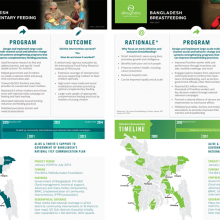
Breastfeeding and complementary feeding intervention summary and results
These two infographics summarize Alive & Thrive’s work in Bangladesh from 2009 to 2014. The rigorously evaluated intervention resulted in large scale improvements in exclusive breastfeeding and complementary feeding practices.

